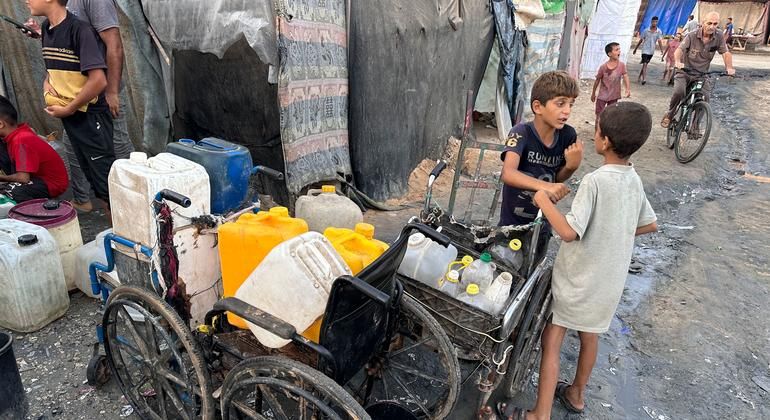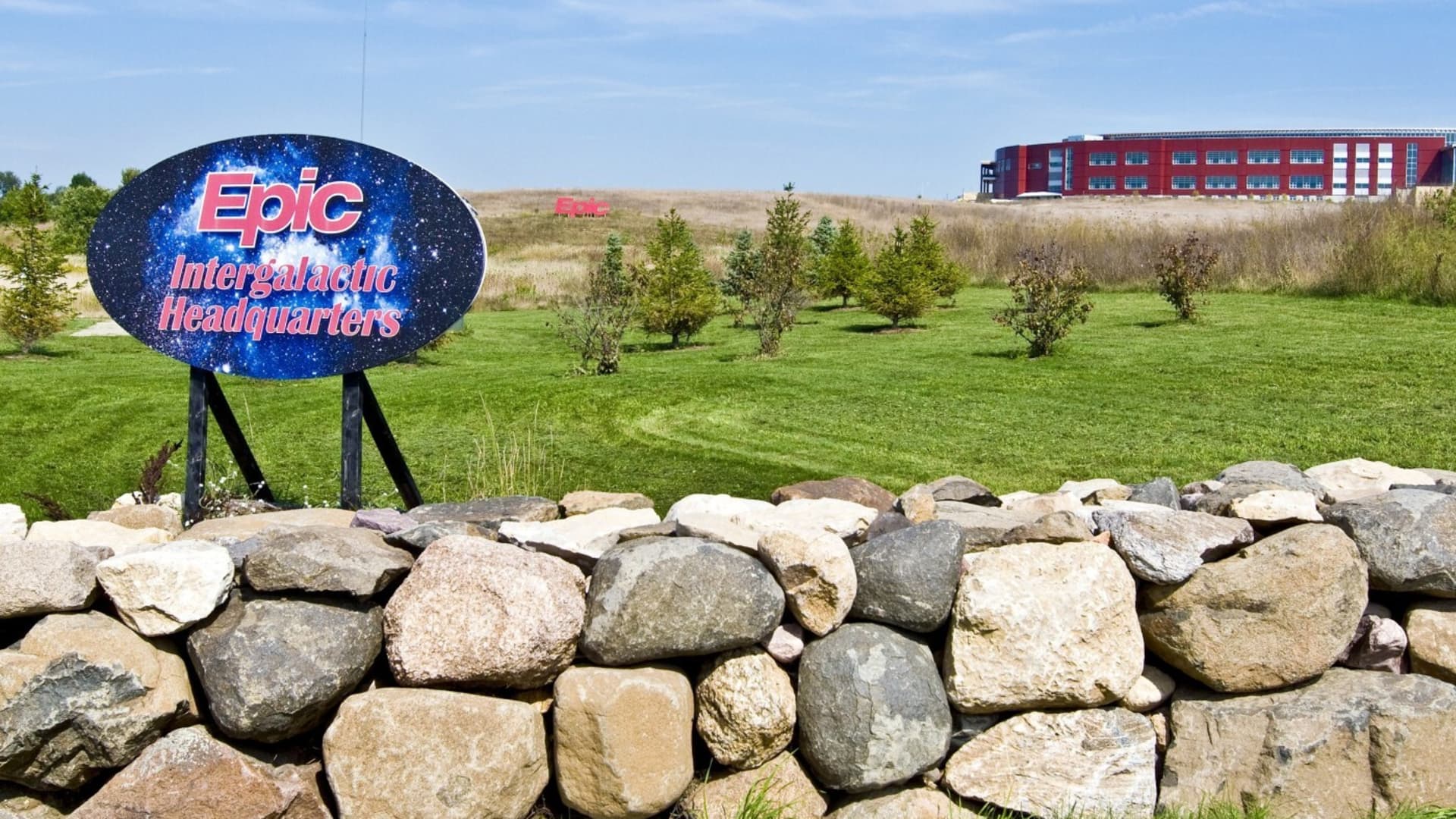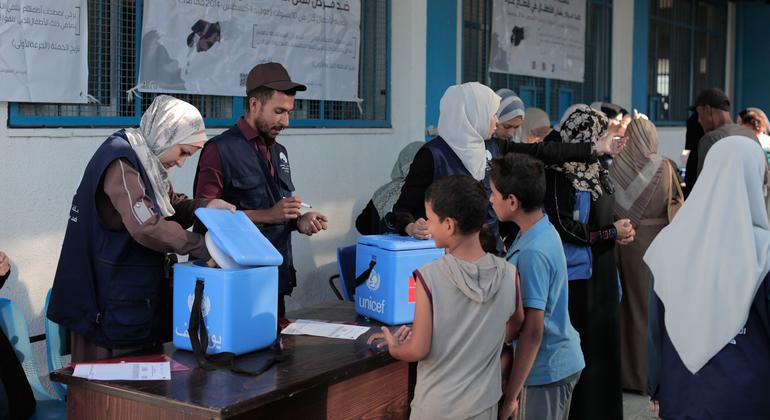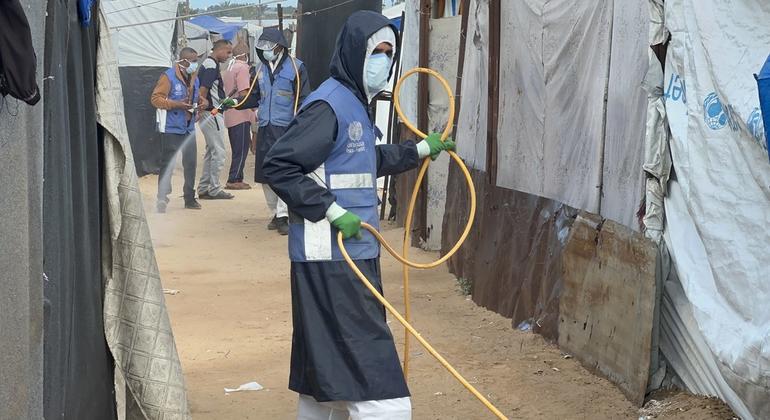WHO Representative for the Occupied Palestinian Territories (OPT), Dr Rik Peeperkorn, said the two-round vaccination campaign will begin on Sunday in central Gaza for three days, before moving to areas in the south and north. A second dose will be administered after four weeks.
“During each round of the campaign, the Palestinian Ministry of Health, in collaboration with WHO, [the UN Children’s Fund] UNICEF, UNRWA [the UN agency for Palestine refugees] and its partners will provide two drops of the new oral polio vaccine type 2 (nOPV2) to more than 640,000 children under 10 years of age“,” Dr. Peeperkorn said.
Ready-to-use doses
The campaign is ready after the delivery of 1.26 million vaccine doses to Gaza and 500 vaccine carriers. According to the UN health agency, an additional 400,000 vaccine doses will soon arrive in Gaza.
Speaking from Gaza, Dr. Peeperkorn welcomed a preliminary engagement with the Israeli military to “Area-specific humanitarian pauses” during the vaccination campaign.
“We call on all parties to stop fighting to allow children and families safe access to health facilities. and community outreach workers to reach children who cannot access health centers for polio vaccination,” he said.
Without humanitarian pauses, the campaign – a huge task in any context, and even more so after more than 10 months of heavy fighting, mass casualties and displacement – will not be possible, the WHO warned.
The campaign will be carried out in phases of three days each, starting in central Gaza, followed by the south and finally northern Gaza.
Obstacles to overcome
Vaccinations will be extended by one additional day when necessary to account for increases in violence, destroyed roads and damage to infrastructure – all additional obstacles that could hinder the goal of achieving sufficient vaccination coverage within three days in each area.
Vaccination coverage of at least 90 percent is needed during each round of the campaign to stop the outbreak and prevent the international spread of this sometimes fatal waterborne disease, which can cause lifelong paralysis.
The UN health agency will coordinate with all parties, including the Israeli humanitarian coordination unit, COGAT, to ensure safe access to health facilities for children and families.
“Safety is paramount” for more than 2,180 health workers and community workers willing to support the campaign, Dr. Peeperkorn insisted.
The vaccines will be distributed in 392 locations and will be supplemented by some 300 mobile teams, a system that is “not ideal” but has been agreed “with all parties,” he continued. “We will do everything possible to achieve 90 percent coverage.”
According to WHO, routine immunization has historically been “very well received” in Gaza and the West Bank, and parents are eager to take their children to get vaccinated. Coverage has reached 95 percent in recent years, higher than in many countries..
Operation continues in the West Bank
As Israeli military operations in the West Bank reach their fourth day, humanitarian workers have expressed concern for the safety of civilians and aid workers.
Israeli Security Forces (ISF) raids in the densely populated towns of Jenin and Tulkarem have reportedly killed at least 15 people.Barrier-free accessibility to facilities is crucial for reaching and receiving care, but also for delivering healthcare.“We call for the protection of infrastructure, ambulances, medical personnel around hospitals and healthcare facilities,” stressed Dr. Peeperkorn.
UN Secretary-General António Guterres condemned the escalation on Wednesday night and called for an “immediate cessation” of Israeli operations in the occupied Palestinian territory.
Since the start of the war, 652 Palestinians have been killed in the West Bank and East Jerusalem, including 150 children, according to the Palestinian Ministry of Health. More than 5,400 people have been injured.












